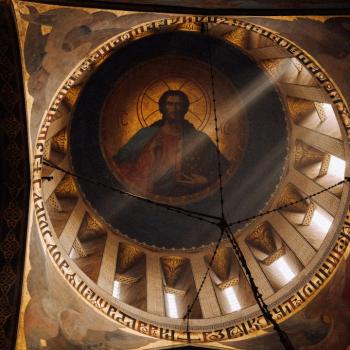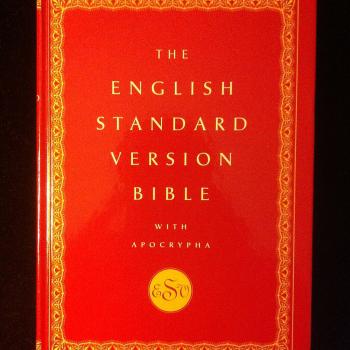And the Word was made flesh, and dwelt among us, (and we saw his glory, the glory as it were of the only begotten of the Father,) full of grace and truth (Jn. 1:14, Douay-Rheims)
Only-Begotten Son and Immortal Word of God,
Who for our salvation didst will to be incarnate of the holy Theotokos and Ever-Virgin Mary;
Who without change didst become man and was crucified;
Who art one of the Holy Trinity, glorified with the Father and the Holy Spirit:
O Christ our God, trampling down death by death, save us. (from the "Hymn of the Incarnation," 4th-5th century)
What God begets is God; just as what man begets is man. What God creates is not God; just as what man makes is not man. That is why men are not Sons of God in the sense that Christ is. They may be like God in certain ways, but they are not things of the same kind. They are more like statues or pictures of God. (C.S. Lewis, Mere Christianity)
Trinitarian theology is inevitably like insider baseball: the moment you start ruminating on it, people's eyes glaze over as if it's just far too technical to talk about. The terminology itself is to blame: that's the problem with the Niceno-Constantinopolitan Creed that Catholics say at Mass every Sunday. It reflects the doctrinal disputes of the early centuries of the Church, and as such gets pretty technical ("only-begotten" and "consubstantial," for example, don't generally show up in ordinary conversation).
Yet baseball insiders and theologians will tell you that technical details do matter, that they affect the way you think and pray and hope for the future. (Disclaimer: as a Cubs fan I can tell you that the technical details of what Theo Epstein is up to very much affect what I think, how I pray and hope for the future. But that's another matter altogether.)
I believe that Jesus is the Only Begotten Son of God because I believe
- that if God is God, then there must be an Incarnation; and
- that if God is God, then there need be only one Incarnation.
1) If God is God, then God is altogether other than everything in creation. God is not part of creation; therefore God does not, in the sense that people frequently misuse the term "exist." Only things within creation exist.
Yet if we understand God as altogether outside of creation, then there is a radical disjunction between creation and God. Without the Incarnation, all creatures would be radically cut off from God. With an incarnation, God takes a place within creation and thereby renders a way by which all creatures have access to God.
2) In the Divine Comedy, Dante famously places himself as the central character and writes from the perspective of both vulnerable character and omniscient narrator. Dante the character suffers from fear, expresses limited understanding, discovers new territory throughout his pilgrimage through hell to purgatory and paradise. Yet Dante the author describes the entire architecture of the cosmos within which Dante the character is on his journey. Every letter, word, and image throughout the Divine Comedy bears the imprint of Dante the author. Yet it is Dante the character who, the author tells us, enables the work to be written in the first place.
In an analogous way, Jesus enables God the Father Almighty, Creator of Heaven and Earth, of all that is visible and invisible, to write the story of creation. What the Son does is make every atom testify to the work of the Father, rendering the whole world sacramental. Belief in the Only Begotten Son of God thereby opens a world of meaning, which different peoples have discerned over the ages. We perceive competition among different religious groups; God sees ever-partial (and often false) attempts to give language to the reality that the Incarnation unfolds.
Was Jesus that Son? Here is where we confront the radicality of our faith: we must choose to accept the testimony of the disciples and see what fruit it bears. There have been many others who have claimed to be a son of God (a fascinating 19th-century example in China here), but the testimonies to Jesus—and the two millennia of faith that have followed him—offer a compelling testimony. Even these are not enough, though: for if God is God, and if God has become incarnate in Jesus, then that touchstone of history cannot of itself be the final story. No: if the Incarnation is real, if God has indeed entered human history as a character in the drama, then the whole of history is transformed. To be human, in the words of Augustine, is to be "capable of God"—to be capable of knowing God directly, in one's own flesh and blood, imagination and passion, desire and hope, terror and suffering.





